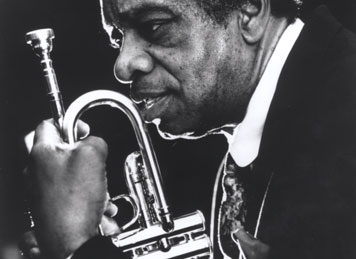- Posted in All University
- Category: Campus News
Trumpet Great to Discuss Theory of Black Music, Careers in Field

Trumpet great and jazz innovator Donald Byrd
Lincoln University, PA (www.lincoln.edu)— Trumpet great and jazz innovator Donald Byrd will visit the Lincoln University campus as part of the Amos Scholarly Lecture Series on Thursday, March 19, at Mary Dod Brown Memorial Chapel. The program begins at 4 p.m. and a reception will follow. The event is open to the public.
Byrd will discuss his legendary musical career, which includes more than 50 albums/CDs, scores of other recordings and artists with whom he’s performed and three Grammy Award nominations. In addition, Byrd will discuss his black music philosophy, his collection and support of African-American visual arts and what young people entering the music industry can expect. Byrd, whose unique blend of jazz, funk and rhythm-and-blues, spans more than four decades, is recognized as one of the key improvisers of the “hard bop” era of the late 1950s and early ‘60s. Byrd continued to make his mark during the 1970s and 80s with one of the hottest contemporary jazz/funk quintets of that era—Donald Byrd and The Blackbyrds. The Blackbyrds are a by- product of Byrd’s music and academia careers intertwining in the 70s—when he served as chairman of Afro-American Studies at Howard University.
While at Howard, Byrd expanded many of the country’s university-level jazz programs as a lecturer and performer who toured the nation.
This duel role and Byrd’s desire to focus on black jazz or funk—helped him discover the five Howard University music students who would ultimately form Blackbyrds—one of the music industry’s top-selling bands during the 70s and 80s. With such hits as Doing It In the Park (Rock Creek Park), Walking in Rhythm and Happy Music during the 70s, Donald created a sound that soon became known as “jazz fusion” —a combination of jazz, funk and rhythm-and-blues.
“We are truly honored and pleased to have Donald Byrd take part in the Amos Scholar’s Annual Lecture Series,” said Dr. Alvin E. Amos, professor of Music for Lincoln’s Department of Visual and Performing Arts. “Dr. Byrd’s music is unmistakable and its impact on the world of “Jazz has been particularly significant in some of the genres that followed such as Rap/Hip Hop. Since I first met him in the 70s, he has consistently been the consummate musician, educator and musical ambassador who is willing to share his knowledge and gifts with student of all ages. Our students, faculty, staff and the public will certainly enjoy interacting with him during the day in classes and come out to hear this music icon.”
The Blackbyrd’s cutting edge sound earned the group numerous R & B awards and three Grammy Award nominations. A life-long student and teacher, Byrd’s list of academic and musical milestones are many. The Detroit native has a doctorate in music education from Columbia University and was instrumental in establishing the now-influential jazz programs at Rutgers University, North Carolina University and the New School for Social Research. He has also served as acting head of the Afro-American/Jazz Studies Department at the renowned Oberlin Conservatory of Music in Ohio.
The Amos Scholarly Lecture Series was founded by descendants of Reverend Thomas Hunter Amos, founder and president of Harbison College in Abbeville, S.C. His father, Thomas Henry Amos, was a member of Lincoln University’s first graduating class in 1859. Thomas Henry Amos died as a missionary in Liberia, Africa. According to Amos Lecture Series Committee, Rev. Thomas Hunter Amos’ descendants established the lecture series to “stimulate the minds of the Lincoln family in pursuit of a liberal arts education, with emphasis on the theological, philosophical, classical, historical and scientific disciplines.”
Founded in 1854 as the nation’s first Historically Black University, Lincoln University combines the best elements of a liberal arts and sciences-based undergraduate core curriculum and selected graduate programs to meet the needs of students living in a highly technological and global society.
Lincoln has the unprecedented distinction among all colleges and universities of having two of its alumni honored with U.S. commemorative stamps. Last month, the U.S. Postal Service honored Thurgood Marshall, the first African-American Supreme Court Justice, and a 1930 Lincoln University graduate, by making him the 26th honoree in Black Heritage Commemorative Series. Last February, the U.S. Postal Service also issued a Commemorative, first class stamp for 1929 Lincoln alumnus Langston Hughes, a world-acclaimed poet.
The University is nationally recognized as a major producer of African Americans with undergraduate degrees in the physical sciences (biology, chemistry and physics); computer and information sciences; and biological and life sciences.
From April 2003 through May 2004, the University will celebrate its sesquicentennial, or 150th anniversary, with an array of campus and external events, activities and announcements. For more information about Lincoln University, please visit our Web site at www.lincoln.edu.